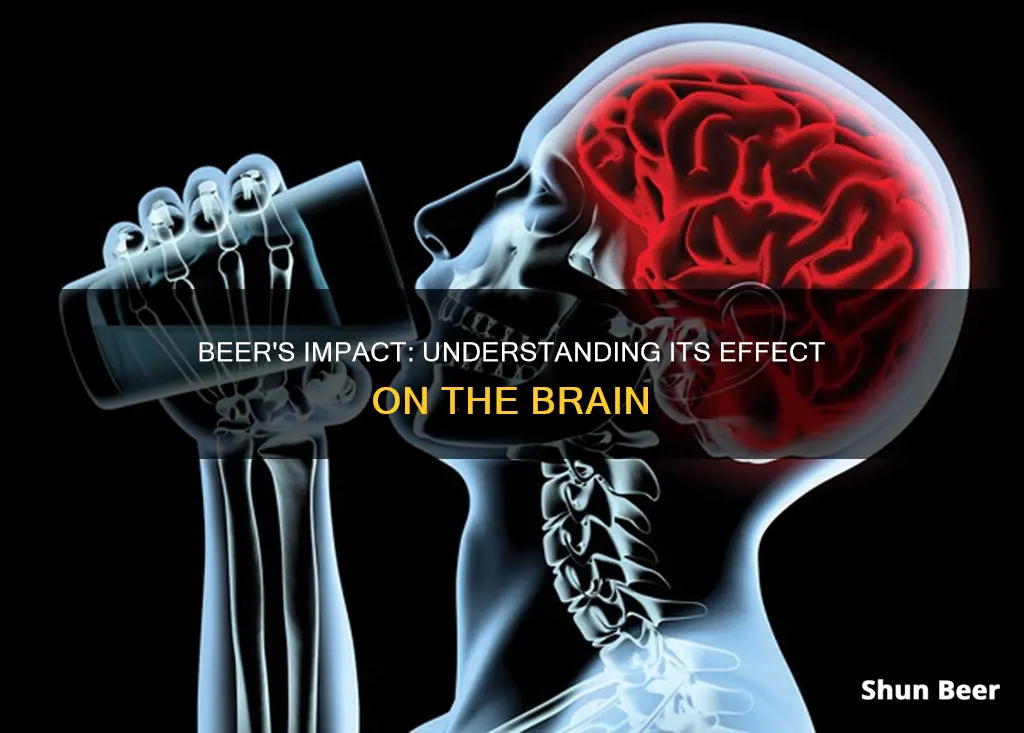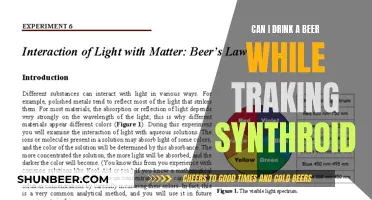
Alcohol is a neurotoxin that affects the brain in numerous ways. Even a single drink can impact cognitive function, leading to slurred speech, blurred vision, and impaired memory. As alcohol is absorbed into the bloodstream, it reaches the brain within five minutes and begins to interfere with its communication pathways. This interference affects the brain's ability to control balance, memory, speech, and judgment, resulting in a higher likelihood of injuries. Heavy drinking over an extended period can cause long-term damage to the brain, including structural and functional changes that compromise brain function and potentially lead to alcohol use disorder (AUD).
What You'll Learn

Alcohol releases endorphins, the feel-good hormones
Alcohol is a complex drug that affects multiple receptors in the body. One of its key effects is the release of endorphins, which are the body's natural opioids. Endorphins are small proteins with opiate-like effects that are produced naturally in the brain. They are released in response to high levels of pain, during aerobic exercise, laughter, gambling, and other pleasurable activities.
When it comes to drinking alcohol, endorphins are released in certain areas of the brain, resulting in a "feel-good" response. Specifically, alcohol triggers the release of endorphins in the nucleus accumbens and orbitofrontal cortex, which are involved in pleasure, reward, reasoning, and decision-making. The more endorphins that are released, the greater the feelings of pleasure and intoxication reported by drinkers. This may help explain why some people drink more than others and why alcohol is addicting.
The release of endorphins by alcohol has been directly observed in humans through studies using positron emission tomography (PET) imaging. These studies found that alcohol intake led to a release of endorphins in both heavy drinkers and non-heavy drinkers. However, the more endorphins released into the front area of the brain, the greater the feelings of intoxication were reported by heavy drinkers compared to non-heavy drinkers.
The distinction between the "buzz" from endorphins and the impairment from alcohol's other intoxicating effects, such as slurred speech and loss of balance, is important. It is the pleasure from the endorphins that drinkers seek, not the negative side effects of alcohol. This understanding of how endorphins control drinking can lead to the development of more effective treatments for alcohol abuse and help people drink less or quit.
Is Budweiser Beer Gluten-Free? Safe for Celiacs?
You may want to see also

It can affect the brain's communication pathways
Alcohol can affect the brain's communication pathways in several ways. Firstly, it interferes with the brain's ability to process information, including memory, reasoning, and judgment. This interference can lead to a higher likelihood of injuries and other negative outcomes. For instance, drinking can cause blurred vision, slurred speech, and impaired memory and reaction time, increasing the risk of accidents.
Secondly, heavy or binge drinking can interfere with the brain's communication pathways by altering the levels of neurotransmitters. Alcohol increases the effects of gamma-aminobutyric acid (GABA), leading to sluggish movement, slurred speech, and slow reaction time. It also decreases the effects of glutamate, which regulates dopamine in the brain's reward centre, resulting in feelings of pleasure. These changes in neurotransmitter levels can have a significant impact on behaviour, emotion, and physical activity.
Thirdly, alcohol can affect the brain's communication pathways by causing structural changes in the brain. Research has shown that heavy drinking can lead to brain atrophy or shrinkage, particularly in the hippocampus, which is associated with memory and reasoning. Long-term heavy drinking also causes alterations in the neurons, such as reductions in their size. These structural changes may be irreversible in some cases, leading to permanent brain damage.
Finally, alcohol can affect the brain's communication pathways by disrupting the GABA system. As a GABA-A receptor agonist, alcohol binds to the GABA-A receptor and relaxes the brain, leading to feelings of calmness and ease. However, excessive use of alcohol can be harmful to the brain and the mind, as it works on multiple receptors in the body.
Beer and Nyquil: A Safe Mix?
You may want to see also

Heavy drinking can lead to Wernicke-Korsakoff syndrome
WKS is comprised of two conditions: Wernicke's encephalopathy and Korsakoff's psychosis. Wernicke's encephalopathy is the acute phase, characterised by confusion, loss of muscular coordination, abnormal eye movements, and vision changes. Korsakoff's psychosis is the chronic phase, causing significant impairment in learning and memory, and interfering with a person's ability to function normally.
Symptoms of WKS include severe and persistent memory impairments, including anterograde amnesia (difficulty forming new memories) and retrograde amnesia (difficulty recalling past memories). Individuals may also experience hallucinations, behavioural changes, and confabulation (making up stories to fill in memory gaps). WKS can cause permanent memory loss and even lead to a coma or death if left untreated.
The prevalence of WKS is estimated to be around 1-2% in the general population, but it affects up to 12-14% of those with chronic alcohol misuse. It is more common in men, typically between the ages of 30 and 70, and those over 40. However, women and younger individuals may develop the syndrome due to causes other than alcohol.
While there is no cure for WKS, early detection and treatment are crucial. Emergency treatment with thiamine supplementation can help relieve symptoms and prevent permanent damage. Abstaining from alcohol is critical to prevent further brain damage and slow the progression of the disorder.
Hotel Drinking: Beer Rules and Room Service
You may want to see also

Alcohol increases the risk of developing dementia
Alcohol is a neurotoxin that can damage brain cells and increase the risk of developing dementia. It is rapidly absorbed into the bloodstream and reaches the brain within five minutes, affecting the brain's communication pathways and information processing. Chronic alcohol use can lead to structural changes in the brain, causing atrophy and shrinkage, particularly in the hippocampus, which is associated with memory and reasoning. Long-term alcohol use increases the chances of developing dementia and can also lead to other memory disorders such as Korsakoff syndrome or Wernicke's encephalopathy.
The risk of developing dementia is influenced by the amount and frequency of alcohol consumption. Heavy drinking is defined as four or more drinks per day for women and anyone 65 years or older, and five or more drinks per day for men under 65. Moderate drinking is defined as one or two drinks per day, and occasional drinking is less frequent. While moderate drinking is generally not considered to increase the risk of dementia, heavy drinking significantly raises this risk.
Research suggests that the link between alcohol consumption and dementia may be influenced by additional factors. For example, moderate drinkers tend to have higher socioeconomic status, which is a protective factor against dementia. Additionally, the group of non-drinkers may include former drinkers who abstain due to health issues related to excessive drinking, skewing the results. Furthermore, the definition of moderate drinking varies across studies, and there may be underreporting of alcohol consumption in some cases.
In conclusion, while moderate drinking may not directly increase the risk of dementia, heavy alcohol consumption is clearly linked to an increased risk. The effects of alcohol on the brain are complex and influenced by various factors, and further research is needed to fully understand the relationship between alcohol and dementia.
Beer and Fluconazole: Is It Safe to Drink?
You may want to see also

Adolescent brains are more vulnerable to the negative effects of alcohol
Adolescents are motivated to explore and take risks, and their brains have an increased ability to change in response to experiences (brain plasticity). While this can provide incredible opportunities for learning and personal growth, it also makes adolescents more vulnerable to the short-term and long-term negative effects of alcohol. Research has linked the early initiation of alcohol use to unsafe alcohol-related behaviours and poor decisions, such as drinking and driving, unsafe sexual behaviour, and other substance use, which can result in injuries, sexual assaults, and even death.
The systems of the brain that respond to rewards and stressors are very active in adolescence, while the areas involved in planning and decision-making (the prefrontal cortex) are among the last to mature, typically in the mid-20s. This imbalance can put adolescents at greater risk of harm from alcohol, as they may continue drinking and reach higher blood alcohol levels despite impairments in decision-making and impulse control.
Alcohol use during adolescence can interfere with the process of brain development, affecting the rest of their lives. It can negatively impact cognition, brain structure, and function, with long-term alcohol use leading to structural changes in the brain. Research has shown that early alcohol use is associated with measurable impacts on cognitive functions, memory, and school performance, and can increase the risk of developing alcohol use disorder, anxiety, and depression during adolescence and later in life.
The good news is that the adolescent brain's ability to change with experience also lends itself to recovery from some alcohol-induced changes. Parents and teachers play a crucial role in shaping adolescents' attitudes about alcohol and can help set them up to make healthy choices.
California Beach Beer Drinking: What's Allowed?
You may want to see also
Frequently asked questions
Even one beer can impact your cognitive function, causing decreased hand-eye coordination, slower reaction time, impaired memory and reasoning, and nausea.
Long-term heavy drinking can lead to structural changes in the brain, including brain atrophy and shrinkage, particularly in the hippocampus, which is associated with memory and reasoning. This can result in permanent brain damage and an increased risk of developing dementia.
Beer, like other alcoholic drinks, triggers the release of endorphins, often referred to as "pleasure hormones," which bind to opiate receptors in the brain. Beer also increases the effects of gamma-aminobutyric acid (GABA), a neurotransmitter that can induce feelings of relaxation.
Yes, drinking beer, especially in heavy or binge amounts, is associated with negative outcomes for brain health. However, moderate drinking (one beer per day for women and up to two for men) is generally not considered harmful and may even have some cardiovascular benefits.







